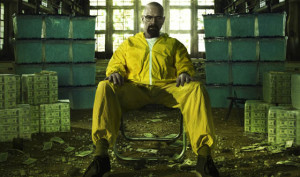A guest post by Frog Jones.
In my day job, I’m a public defender. This means, among other things, that any time I am placed on panels at conventions, invariably one of those panels will be the “What Makes A Good Villain” panel. After years of giving this panel, I can say with a certainty that the question of how to build a really solid, evil character is one of the harder challenges in writing.
Because here’s the thing: humans don’t set out to be evil. Nobody wakes up in the morning and says to themselves “That’s it. Time to go dark. I am going to start the killing with…you.” Doesn’t happen that way. No, evil is a slow, insidious process of a thousand decisions, each one of which appears to be completely correct at the time, but the sum total of which is a monster.
I’m talking about villains, here. Not just antagonists; that can be any opposing force. I’m talking about truly evil people who want to do truly evil things. Writing someone like that who doesn’t come off as a mustache-twirling dude in a top hat next to a woman whom he has strapped to some train tracks is a real trick.
And this is why I want to talk about Walter White.
Walter is, in the beginning of the series, just a normal guy. He teaches high school  students, has a wife and a disabled son. He works a second job at a car wash to pay the bills, and even then the family is just barely getting by. They cannot afford a new water heater. Still, it’s his pride to be the guy taking care of his family. He’s constantly under stress, but he takes that stress and bottles it down because, well, that’s what you do.
students, has a wife and a disabled son. He works a second job at a car wash to pay the bills, and even then the family is just barely getting by. They cannot afford a new water heater. Still, it’s his pride to be the guy taking care of his family. He’s constantly under stress, but he takes that stress and bottles it down because, well, that’s what you do.
Fast forward to Season Five, and Walter White is a drug lord with no compunctions about murdering for his territory or threatening his family. He is, by anyone’s account, evil.
 Now, I’m not saying you have to write five seasons of a television series to get a believable villain into your plot. But I do recommend that you figure out how and why your villain broke bad. And Walter White is a great model of the basic things you need to get there.
Now, I’m not saying you have to write five seasons of a television series to get a believable villain into your plot. But I do recommend that you figure out how and why your villain broke bad. And Walter White is a great model of the basic things you need to get there.
For Walter, the cancer triggered him. Once he knows he’s dying of cancer, he realizes he will no longer be able to take care of his family. And that right there? It’s the one thing he had. Oh, he’s not rich like his college buddy who didn’t sell his stock early, but he is taking care of his family. It’s the one thing he has to be proud about.
This pride? It’s normally considered a virtue in society. Walter wants to make sure that he’s the guy who provides, not someone else. Good on him, right? Way to stand up and take responsibility. Way to “be a man.”
So now we have a series of pressures placed on Walter. One is his financial pressure, because he never has enough money to provide for the basics of life. The next is his self-applied pressure to provide for the family himself. When the cancer comes along, it adds a ticking clock. Now Walter has to make a significant amount of money very, very quickly, because to do otherwise would be to fail in his responsibility to his family.
See what happened there? Not a bad guy. Just a guy put in a position where all the pressures on him forced him into a situation where the next choice seems perfectly logical. If you’re a professional chemist, and you need to make a lot of money very quickly, then cooking meth makes a lot of sense.
This right here? This is the point where you need to take your villain. It may be backstory, in your case; it certainly was in mine. But in the life of every evil person, and I know this as someone who spends his entire life working with evil people, there is a series of decisions that lead, inevitably, to damnation. And it starts with one.
Walter’s decision is wrong. But it’s perfectly logical. It makes sense. He’s going to die anyways, so the legal consequences aren’t really a big deal. He needs the money. Someone is going to sell meth to these junkies, and that meth will be laced with all kinds of other things, because they aren’t nearly as good at this as Walter.
This is the moment. The moment where your villain goes wrong. The moment where he or she makes the decision to do the wrong thing for all the right reasons. After that, it’s a slow and gradual slide into hell.
Not every story can or should be Breaking Bad. But everyone who wants to write an evil character should watch Breaking Bad, because it is a perfect case study in how a villain is born.
Frog Jones writes with his wife, Esther. After a ten-year vow to never show each other a word they had written, they eventually broke down and wrote a novel together. Together, they have published the Gift of Grace series from Sky Warrior Books, as well as short stories in anthologies such as How Beer Saved the World, First Contact Café, and Tales from an Alien Campfire, as well as many more.
The Joneses live on the Puget Sound in the State of Washington with Oxeye, who is twenty-five pounds of pure bunny. Frog’s works can be found at http://www.jonestales.com, and he also appears on the Three Unwise Men podcast at http://3unwisemen.com.

